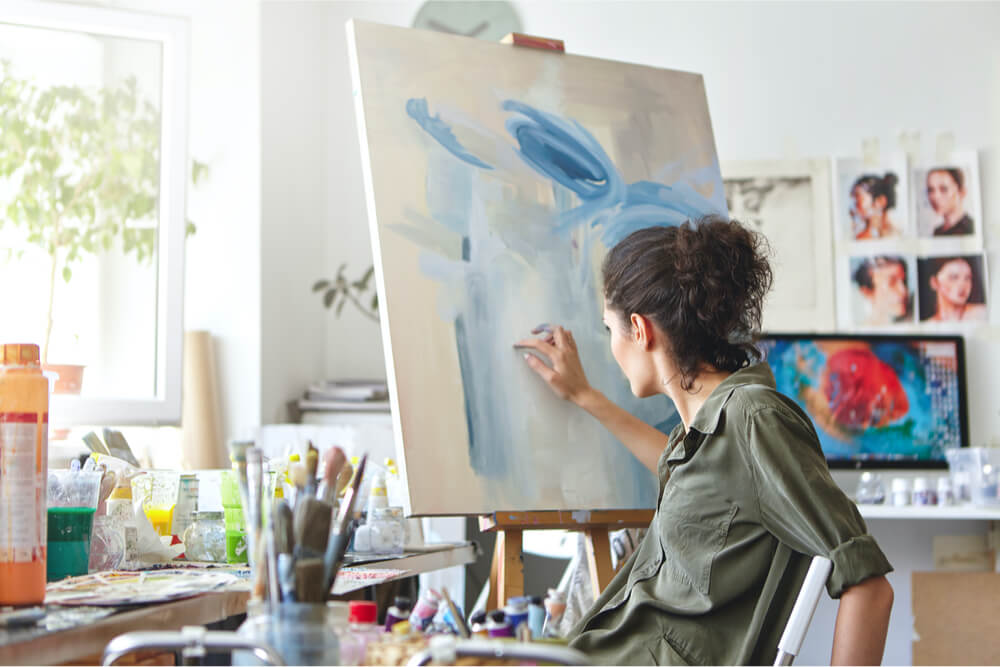
There has been much fascination between the link of art expression and the artist's mental health. Interest comes from the fact that some artists are known to struggle with particular mental health disorders. The pattern dates back centuries. Among the more popular artists is the work of Vincent Van Gogh, who tragically died by suicide. Many now believe that Gogh's work suggests his anxiety, stress, and depression because of its eccentric and often melancholy portrayals of people and places.
While there is evidence suggesting that art is the extension of one's mental health — including providing clues — some contend whether the primary influence draws from their mental health or the artist's beliefs. Is the influence of artists' stereotypes perpetuating their emotional responses in their lives and their art?
Tortured Artist
The tortured or starving artist stereotypes is perhaps the most popular belief about the life of an artist. While artists can be unhappy, frustrated, and even depressed people, some psychologists wonder if some artists need to believe these stereotypes to create. It is in relationship to the starving artists: these are those that sacrifice their wellbeing to put their art first. Creativity is a form of therapy that creates fantastic worlds and human portrayals, but what happens when this form of therapy no longer works effectively? Healthcare professionals question if the art used to cope with mental health disorders stems closer to the artist's sense of identity. Therefore, the artist's lost sense of self is the true motivation for their art.
Mental Health and Identity
A person's mental health disorder can become weaved into their identity. When a person comes up against the idea of getting better, they might begin to wonder who they are without their problems. Such behaviors and doubts can occur in people with chronic stress, depression, and addiction, and not only does this person continue to revert to their chronic behaviors, but they might be less likely to seek treatment. For an artist, the desire to be profound might outweigh the necessity of getting help which can further perpetuate their mental illness.
Some artists may suffer from impostor syndrome. Those with imposter syndrome believe that their success has happened by pure chance and not on their achievements. Impostor syndrome can also create feelings that certain things are undeserved. The space between their expectations differs between where they think they should be and where they actually are.
Is There a Direct Link?
A study conducted by the Office of National Statistics showed that people who work in arts-related fields were up to four times more likely to die by suicide. However, many psychologists are skeptical about the direct link suggesting that people with emotional volatility might be drawn into the creative and entertainment industry. Thus more people are more aware of such status when they suffer from a debilitating mental health problem.
It is more than status; it is also lifestyle changes that could be the direct link. For example, those who like to work late into the night might find more inspiration for creativity. However, their everyday lives might not support their creative exploits. These choices to balance art and other responsibilities can cause poor sleep, nutrition, lack of focus, lack of exercise, and substance abuse. Neglect in any of these areas could also perpetuate underlying mental illness and even harm physical wellbeing.
No Overarching Explanation
Creativity does not beget depression and suicide — not every creative person has anxiety or other disorders. Creativity can become a scapegoat to self-diagnose, define and even jump to conclusions about a mental health disorder. Still, this kind of belief undermines both mental health facts as a case by case and creativity. While some artists might exacerbate their illnesses with their pursuits of creating profound works of art, many other artists find comfort in art and even use it to help others through difficult times.
Art is healing and is an excellent way for people to express and discover their inner emotions. Such emotions might be attached to difficult memories, and art can be used as a catalyst to help people overcome specific trauma in their life. Exploring creative outlets also promotes honesty, structure, and a sense of achievement. These are all positive aspects to practice in life and recovery. Taking the time to understand better your mental health and how it relates to how you express yourself could lend more insight and a deeper understanding of yourself.
Using art and other substances negatively to hide, avoid or perpetuate a mental health disorder does more damage than good. It will require finding the correct treatment to attain mental and physical health. At START UP RECOVERY, our goal is to help you assess, confront, and experience your most tremendous potential, including the underlying thoughts and emotions attached to your mental illness. Our program includes helping you cope with and manage your behaviors. We also believe that creative pursuits are among one of the most beneficial ways to provoke inspiration toward success. However, if you have been using it to perpetuate negative mental perceptions, we will work with you to understand and use art as a beneficial tool to discover self and balance. Mental illness arises in many different forms and is affected by many other behaviors, and it only starts to improve when honesty and a proactive approach to better understanding occur. To begin the journey to recovery, call START UP RECOVERY today at 310-773-3809.
